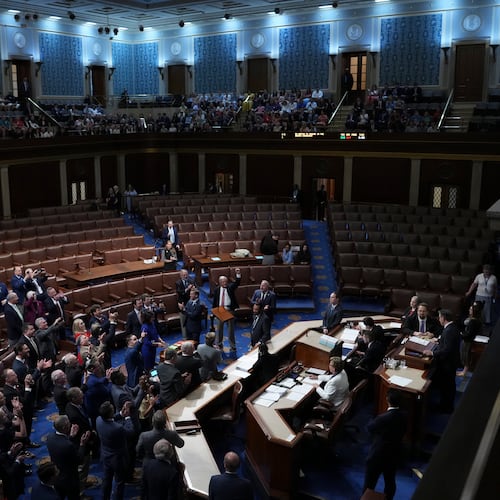The Peach State parade of presidential candidates and near-candidates continued Monday, with Wisconsin Gov. Scott Walker hitting Atlanta for a couple of private meetings. Walker, who has said he'll announce his intentions after his state budget process wraps up later this month, told me in an interview that he hears much the same refrain from Georgia voters as he does from folks in states more accustomed to early primary attention.
"The common denominator from Iowa, New Hampshire, South Carolina, and here today, and elsewhere," Walker said, is that "people come out and they know what we did to take on the big-government special interests a few years ago. They like that we didn't just fight but we won those battles -- not just then, but we've consistently won since."
Those battles, notably limiting collective-bargaining rights for some public workers and requiring them to pay for a larger share of their benefits, drew national attention in 2011, Walker's first year in office. Teachers unions and their allies filled the capitol in Madison, which in turn was abandoned by some Democratic lawmakers who skipped town to deny a legislative quorum and keep the measures at bay. That ploy eventually failed, as did Democrats' related attempt to recall him from office in 2012 ... and then their bid to deny him re-election last year. Walker indicated that track record of winning, both in elections and once in office, sets him apart from others in the GOP's still-growing 2016 field.
"There's a lot of good Republicans in Washington," he said, referring specifically to the quartet of senators running for president: Ted Cruz, Lindsey Graham, Rand Paul and Marco Rubio. "All good fighters, fighting the good fight on a variety of issues. But they haven't won anything, they haven't gotten anything accomplished.
"There's another group of candidates, or would-be candidates," he continued, "who are governors or former governors, who have been good winners, who have won elections, re-elections, but they haven't taken on any really big fights. I think what makes us unique, if we get in, is we've done both."
In what ways, I asked, does Walker think those fights in Wisconsin would have prepared him for what he'd face in Washington if elected?
"You've got to act quickly," he began. "You've got to use your honeymoon period. You've got to be bold and start working in the campaign and then really work in between the election date and the time that the legislative session starts ... and put an agenda out there. To me, I believe in full-scale reforms, so (that means) a major transfer of power and money from the federal government to the states.
"So you push the obvious things, what's in the House budget like (more state control over funding for) Medicaid, but I'd go beyond Medicaid and other social services. Transportation infrastructure funding. Environmental protection -- all 50 states have an equivalent, why do we have all these duties … overwhelmingly at the EPA, why not push them back to the states? Workforce investment dollars. Even education, I think we'd be better-served if, instead of sending a dollar to Washington, we sent that dollar to our states and kept it in our schools. Those are really big, bold reforms that I think you could push early on and have, as we did with our reforms, it wasn't a short-term fix, it was a long-term, structural reform. I think the same thing would be true there."
A reform of work-force investment programs is one idea he said he pursued as governor with state money, instead of waiting for the federal government to act.
"I heard so many employers, particularly in manufacturing, say, you know, I've got five (open) welding positions, but if I could fill these, I'd have 10 more. Or I'd hear the same with coding and IT, or health care professionals, physicians assistants, nursing assistants, other positions like that. So what we did, we gave money to all 16 of our technical colleges … but we said we're going to give you the money, not based on by dividing it by 16, or by students. We're going to divide it by how you score on your application. So we said, here’s a pot of money. You show us how effective you are at identifying where there’s a wait list in high-demand areas, and how it meets the needs of employers within that region."
The result, he said, was a focus on high-demand jobs such as diesel mechanics, welders and dental technicians: "We said, you show us where it meets a need out there, because we want to pay for performance. We want to know where we invest, this money's going to go to put people on a career path where there's actually a job waiting for them."
Whether Walker has a job waiting for him in the White House remains to be seen. Later this week, I'll post some more of his thoughts about how a Republican can win in 2016.
About the Author
Keep Reading
The Latest
Featured


